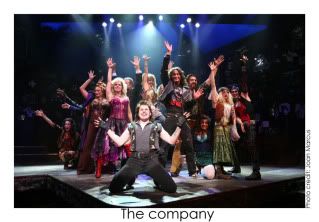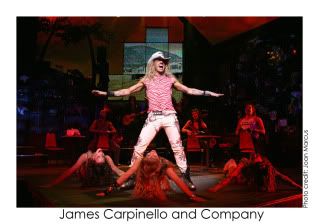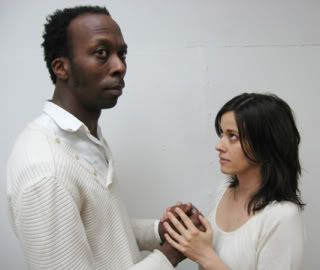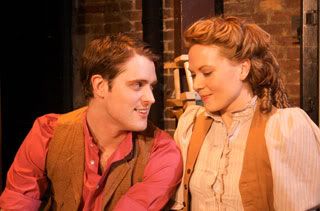I’m not one of those critics who like to wail about the decline of innovative theater in New York. Sure, things are tough for arts organizations of all kinds and certainly for independent theater groups, and you have to be especially tough to make it in our beloved Big Wormy Apple. But that’s always been true. From where I sit — and I sit in a lot of hard, cramped seats — the pool of talent here is deep, wide, and well-nourished. The wonder is that so many extremely talented people do so much so well for so little reward.
To go with its jigsaw-puzzle structure and precision dialogue, Adam Szymkowicz’s fine psychological comedy-drama Pretty Theft has pathos, sharp humor, a dash of horror, dancing, and many scene changes. It’s the kind of play that demands an exceptional production, and that’s just what it gets at the Access Theatre on lower Broadway. In her first full-fledged directing job for the Flux Theatre Ensemble, Angela Astle maneuvers Szymkowicz’s expertly drawn characters and their incisive, insightful scenes with the finesse of a chess grandmaster.
As the audience files in, ballerinas are warming up in a dance studio crafted from a couple of rails, a mirrored board, a lot of space, and a lot of mauve. The dancers eventually take on multiple functions: interpretive spirits, figures of beauty and gladness, a Greek chorus. But at the start they quickly make way for what seems a graceless story. Shy Allegra (the splendid Marnie Schulenburg), just out of high school and headed for Dartmouth, is persuaded by her voluble, desperately flirtatious schoolmate Suzy (the exquisitely expressive Maria Portman Kelly) to join her in a summer job as a caregiver at a group home for troubled adults. Here Allegra bonds with Joe, a formerly high-functioning autistic man who’s been stashed in the home after the death of his doting father.
As in classic fairy tales, no one here has functional parents. Allegra’s father is dying in the hospital while her mother sits at home staring at the TV, resentful and withdrawn. It’s no wonder she suffers from the stereotypical teenage ailment of roadkill-low self-esteem, and to makes matters worse, her oafish boyfriend (an effective and funny Zach Robidas) is primed to dump her.
Joe responds to Allegra as to no other member of the staff, but their fractured friendship is no occasion for a heartwarming tale of personal growth and lessons sweetly learned; Szymkowicz is far too perceptive and subtle for such after-school-special tripe. When Allegra’s supervisor at the home calls her a natural — “Are you sure you’ve never done this before?” — the phoniness of the adult world is made plain to her; we feel her disillusionment at discovering the emptiness at the heart of things.
Thanks to the film Rain Man and various books, the autistic savant has become a fixture in popular culture. He’s an easy tragic figure because he shares so much with us “normals” yet can’t be one of us. But Szymkowicz doesn’t use Joe (ably portrayed by Brian Pracht) as a disposable needle for injecting self-awareness lessons into our heroine. Joe is a solid character, even a tragic figure in his own right. Just like Allegra and Suzy, he’s insecure and fragile, and lacks useful parental figures. Just like them, he’s treated unfairly by a world that professes to care but doesn’t understand him. And just like them he makes us laugh at unexpected moments.
While Joe’s fate darkens, the girls hit the road and fall victim to Marco, an icily charismatic thief who comes to their “rescue” when the road trip sours. Yet we’re never more than a step away from the light. Not the light of redemption, exactly, but the light that emanates from the uncomplicated power of beauty. Anything pretty, Marco philosophizes creepily, must be “wrong.” But in the end a wiser Allegra insists, albeit in a small voice, that it’s not so.
There’s a little Jack Nicholson danger in Todd d’Amour’s Marco. For the better part of the play’s 90-plus edgy minutes he’s making slithery time with a small-town waitress in a side plot that runs its own course, then converges with the main line with a click that suddenly seems inevitable. The technical sureness of Heather Cohn’s set pays big dividends, as the ballet barres become the coffee shop counter, a bed-sized platform skilfully portrays several different rooms, and cubes outfitted with handy cloth pouches and that clever mirrored platform do most of the rest of the scenery work. The lighting (Andy Fritsch) and sound (Kevin Fuller) are equally effective in creating the shifting locations and moods: a lunatic asylum, a repair shop, Marco’s date-rape lair, a dream sequence that’s a small tour-de-force.
So the play is a good deal more than the riff on theft promised by the title. Robbed of his livelihood, Joe fills his empty spaces by swiping supplies and toting them around in a box. Suzy purloins her mother’s car, her friend’s boyfriend, and entire displays of beauty supplies. Marco claims to steal for a living, though what he actually takes from people turns out to be something of a surprise. But everything taken is also needed, even if some needs are evil. Szymkowicz’s brilliant stroke is to paint the evil that men do right into the pretty rainbow of yearning that defines humanity. And all with a twinkle, a laugh, a pirouette, and a shiver.
Pretty Theft is presented by the Flux Theatre and runs through May 17 at the Access Theater Gallery, 380 Broadway.











